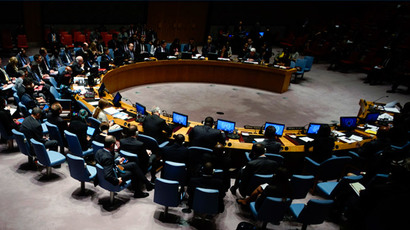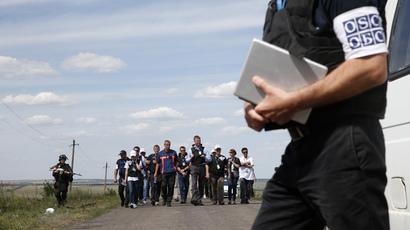Russia fears ethnic cleansing in Ukraine amid rise of neo-Nazism – Putin
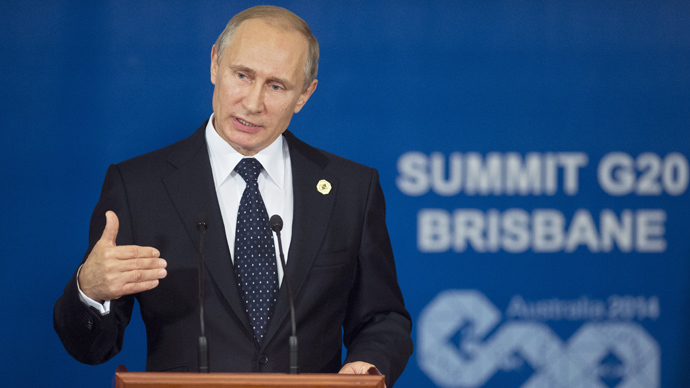
As Kiev continues to amass its forces in eastern Ukraine despite the ceasefire and use radical nationalist groups as armed battalions, Moscow is concerned about possible ethnic cleansing there, Russian President Vladimir Putin told ARD in an interview.
READ MORE: Kiev not fully committed to ceasefire, amasses troops along E. Ukraine frontline – Russia
Speaking with Hubert Seipel of the German channel ARD ahead of
the G20 summit, Putin warned of catastrophic consequences for
Ukraine if the Kiev government continues to nurture radical
nationalism and Russophobia, including in the ranks of its
military and National Guard units that are still being sent as
reinforcements to the country’s troubled east.
“Frankly speaking, we are very concerned about any possible
ethnic cleansings and Ukraine ending up as a neo-Nazi state. What
are we supposed to think if people are bearing swastikas on their
sleeves? Or what about the SS emblems that we see on the helmets
of some military units now fighting in eastern Ukraine? If it is
a civilized state, where are the authorities looking? At least
they could get rid of this uniform, they could make the
nationalists remove these emblems,” Putin said.

Pointing at some difficulties in implementing the Minsk
agreements aimed at ensuring the ceasefire in eastern Ukraine
holds, Putin said the local militias have one clear reason not to
leave the cities they occupy, which is the fear of reprisals.
Moscow has been urging both sides of the conflict to adhere to
the agreements.
“Indeed, self-defense fighters, for example, were supposed to
leave some of the towns they had surrounded, are yet they haven’t
left. Do you know why not? I will tell you plainly, this is no
secret: because the people fighting against the Ukrainian army
say, 'These are our villages, we come from there. Our families
and our loved ones live there. If we leave, nationalist
battalions will come and kill everyone. We will not leave, you
can kill us yourselves.'”
“That is why we have fears that it may all end up this way.
If it happens it would be a catastrophe for Ukraine and Ukrainian
people,” Putin stressed.
The Russian leader dismissed the idea that only Russia has the
key to solve the Ukraine crisis, saying that it sounds as if
someone is trying to pass responsibility for the conflict to
Moscow.
“You know, when someone tells us that we have some special
opportunities to solve this or that crisis it always troubles and
alarms me...I always begin to suspect that there is an intention
to pass on the responsibility to us and to make us pay for
something. We do not want that. Ukraine is an independent, free
and sovereign state,” Putin said.
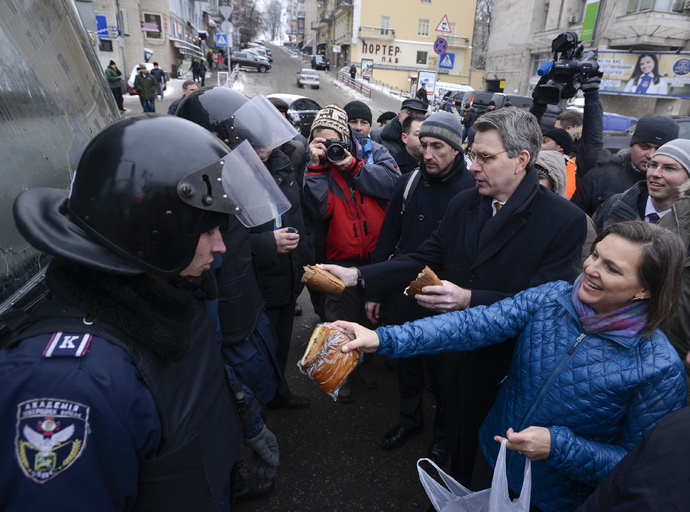
However, the president hinted at the possibility that Western
countries could actually make a difference in the Ukrainian
situation, and persuade the West-leaning government in Kiev to
follow a path of national dialogue instead of sending tanks to
rebel territories.
“There is just one thing that I always pay attention to. We
are told again and again: pro-Russian separatists must do this
and this, you must influence them in this way, you must act in
that way. I have always asked them: 'What have you done to
influence your clients in Kiev? What have you done? Or do you
only support Russophobic sentiments?'” Putin said.
He stressed that supporting Russophobia in Ukraine could result
in “real catastrophe” and urged to seek a joint solution
to the crisis in order to “bring the positions of the parties
closer together.”
READ MORE: Ukraine scraps human rights treaty for rebel areas, cuts services, freezes banks
Russia will not let Kiev simply send armed forces to eastern
Ukraine and “annihilate” its opponents there, Putin
stressed, answering a question of a German journalist.
“The issue is that we can’t have a one-sided view of the problem.
Today there is fighting in eastern Ukraine. The Ukrainian central
authorities have sent the armed forces there and they even use
ballistic missiles. Does anybody speak about it? Not a single
word. And what does it mean? What does it tell us? This points to
the fact, that you want the Ukrainian central authorities to
annihilate everyone there, all of their political foes and
opponents. Is that what you want? We certainly don’t. And we
won't let it happen.”
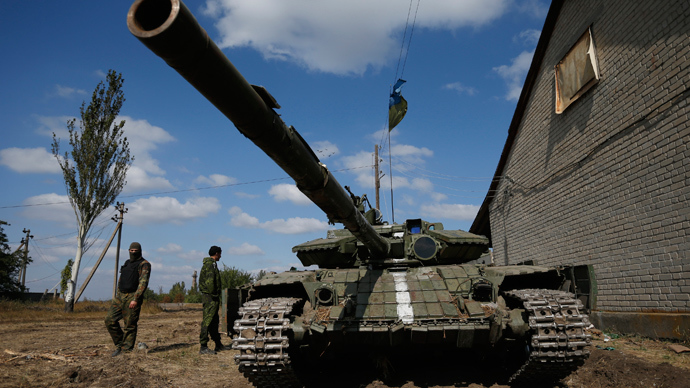
Putin said that those people who consider their cause righteous –
like the anti-government fighters in eastern Ukraine – “will
always get weapons” in the modern world, including armored
vehicles and artillery systems.
Western politicians and media have been accusing Russia of
sending weapons to the rebels – which Moscow denies – but have
provided no hard evidence of the claim. Initially, the
self-defense forces of Donbass armed themselves with weapons and
vehicles seized at military depots in the region, but they also
managed to capture some hardware from the Ukrainian troops. The
Ukrainian army, often severely underequipped, recently started
receiving military aid from several Western countries.
READ MORE: Economic blockade of E. Ukraine a ‘big
mistake’ - Putin
Putin stressed that the Minsk treaties securing the ceasefire in
eastern Ukraine only became possible because Russia managed to
convince anti-government fighters to sit down at the negotiation
table with Kiev representatives.
“The Minsk agreements arose only because Russia became
actively involved in this effort; we worked with the Donbass
militias, that is the fighters from southeast Ukraine, and we
convinced them that they should settle for certain agreements. If
we had not done that, it would simply not have happened,”
the president said.
There are still problems with the implementation of these
agreements, Putin added, saying that both sides are unwilling to
follow some of the points. Both Kiev and the self-defense forces
have failed to leave some of the towns they were supposed to
leave. When confronted about this fact, however, the militia told
Moscow that they are not leaving due to fear of genocide or the
killing of their families, as many fighters come from the same
areas being occupied.
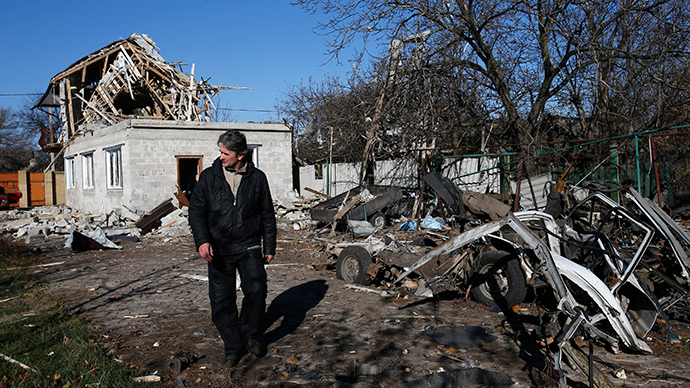
Allegations of widespread abuses – including abductions, unlawful
detention, ill-treatment, theft, extortion, and possible mass
executions at the hands of pro-Kiev forces – have been reported
by several rights groups, including Amnesty International.
“When they say things like that, you know, there is not much
that can be said in response,” Putin said.
“But if the central Ukrainian authorities choose not just to
determine the demarcation line, which is very important today in
order to stop the shelling and killing, but if they want to
preserve the territorial integrity of their country, each
particular village or town are not significant; what is important
is to immediately stop the bloodshed and shelling and to create
conditions for starting a political dialogue. That is what is
important. If it this is not done, there will be no political
dialogue,” Putin stressed.
READ FULL INTERVIEW PUBLISHED NOVEMBER 17 HERE
Instead, however, Kiev seems to have recently amassed new forces
around the rebel-held territories. Russian deputy UN ambassador
Aleksandr Pankin told the UN Security Council on Wednesday that
“throughout the ceasefire period a concentration of Ukrainian
troops was observed almost along the entire front line,” and
there was no withdrawal of heavy weapons in violation of the
Minsk agreements.
“Apparently, Kiev’s fear of the self-defense forces is so
great that it tries to justify their own failures and massive
transfer of personnel and equipment to the front lines by loudly
claiming alleged Russian weapons and army,” Pankin said,
referring to the most recent allegations of “Russian tanks in Ukraine.”
NATO last week said it saw several columns of Russian hardware
entering Ukraine, but added that it does not have a “good
picture” supporting the claims.













